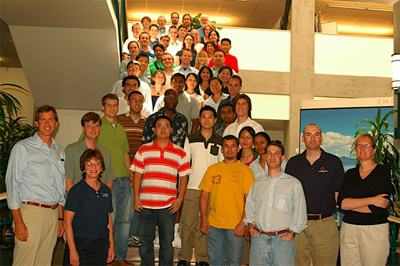
Environmental Factor, August 2008, National Institute of Environmental Health Sciences
2008 Green Technology Entrepreneurship Academy Meets
By Melissa Fabiano
August 2008

The University of California Davis (UCD) Center for Entrepreneurship hosted the Green Technology Entrepreneurship Academy (GTEA) 2008 July 7 – 11 in the Tahoe Center for Environmental Sciences at Sierra Nevada College in Incline Village, Nev. This year’s Academy received major funding from the Superfund Basic Research Program (SBRP) and was sponsored by GTEA founding sponsor, the Ewing Marion Kauffman Foundation, along with the Nevada Institute for Renewable Energy Commercialization, the Sierra Angels and the Pacific Gas and Electric Company (PG&E).
According to its organizers, the 2008 Academy (http://entrepreneurship.ucdavis.edu/green.php) ![]() broadened its focus on environmental health to include the current state of the global environment and the need to "translate environmentally sustainable technologies and research into viable business ventures." The Academy’s week-long curriculum was based on the UCD Graduate School of Management’s technology management and entrepreneurship programs.
broadened its focus on environmental health to include the current state of the global environment and the need to "translate environmentally sustainable technologies and research into viable business ventures." The Academy’s week-long curriculum was based on the UCD Graduate School of Management’s technology management and entrepreneurship programs.
The week’s agenda featured lectures by academics, entrepreneurs and representatives of non-profit organizations concerned with environmental sustainability
- Keynote speaker Amory Lovins, co-founder, chairman and chief scientist of the Rocky Mountain Institute (http://www.rmi.org/)

- UCD Graduate School of Management Professor Andrew Hargadon, Ph.D., director of the Center for Entrepreneurship (http://entrepreneurship.ucdavis.edu/)

- Bill Moore of Windfarm
- John Hanks of National Instruments
- Scott Lenet of DFJ Frontier
- Susan Mac Cormac of Morrison/Foerster
- Representatives of Ventura Capitalist and the Sierra Angels
Participants worked in teams to put their new knowledge to use through practical exercises, hands-on experience, teamwork and mentoring sessions.
For five days, 48 participants representing 23 different universities, 17 states and four countries ventured from the safety of their labs into the business world of technology transfer and product commercialization. The Academy’s goal in the five-day workshop was to provide these science and engineering doctoral students, post-docs and research faculty with skills to develop, evaluate, translate and market their laboratory research.
Colette F. Quinn, an SBRP graduate student at Dartmouth College, commented on the ways the Academy helped her to re-examine her perspective on scientific research. "Sometimes we, as scientists, get consumed with the fundamentals and perfection," she said, "but in business it is about filling a demand or solving a problem quickly and efficiently." According to Quinn, her experience at the Academy left her more confidant about her research, and she determined that she "will market [her] self differently when applying for industrial or consulting positions."
SBRP grantee and Duke University Professor of Molecular Genetics and Microbiology Elwood Linney, Ph.D., agreed. "It was an excellent workshop that was structured well… [and] gave one the organization to recognize what was necessary to bring intellectual property in the form of ideas generated from university research into the commercial field," he said.
From his perspective, Love Sarin, an SBRP graduate student at Brown University, saw the conference as a springboard. "It helped bring home the thought process of figuring out how to think and take action when you have some useful idea[s] with some application in the real world," Sarin explained. "[GTEA] would be a good learning experience for researchers who miss the big picture sometimes."
Attendees interviewed over the past two years have echoed these sentiments and agreed that the GTEA consistently exceeded their expectations. The Academy not only helped scientists develop their ideas, but also, as Sarin commented, "the methodology, the feedback and networks. Everything was useful," he concluded. "These contacts are invaluable."
(Melissa Fabiano is a communications specialist for MDB, Inc., a contractor for SBRP and the Worker Education and Training Program. She is a regular contributor to the Environmental Factor.)
"Superfund Puts Trust at the Top..." - previous story ![]()
![]() next story - "Science Camp..."
next story - "Science Camp..."
August 2008 Cover Page



